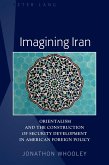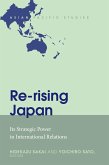Imagining Iran constructs and assembles American foreign policy through critical security studies discourse analysis and Orientalist descriptions of key actors within the presidential administrations of Lyndon Baines Johnson through Ronald Reagan (1965-1989). This book is essential reading for those who are interested in learning about how foreign policy making is conducted, how theories directly affect the process of foreign policy making, and how the shah and Iran served US interests. It also discusses the larger question of why the US uses autocratic proxies to pursue its nominally human rights and democracy-based goals.
Students of foreign policy, Middle East studies, and critical security studies, as well as Iran experts, can benefit from this historical deep dive on policy making. The internal conversations, diary entries, and previously classified documents and briefings tell the story of how the US imagined Iran, and why that ideational construction proved to be such a dominant and pernicious image for 26 years, the reverberations of which are still felt today in our modern conception of what Iran is and what Iranians can do through the lens of American foreign policy.
Students of foreign policy, Middle East studies, and critical security studies, as well as Iran experts, can benefit from this historical deep dive on policy making. The internal conversations, diary entries, and previously classified documents and briefings tell the story of how the US imagined Iran, and why that ideational construction proved to be such a dominant and pernicious image for 26 years, the reverberations of which are still felt today in our modern conception of what Iran is and what Iranians can do through the lens of American foreign policy.
Dieser Download kann aus rechtlichen Gründen nur mit Rechnungsadresse in A, D ausgeliefert werden.
"Jonathon Whooley boldly confronts, with careful and rigorous archival analysis, one of the most important issues of US foreign policy toward the Middle East. He presents a rare and perceptive combination of the construction of American foreign policy toward Iran by deploying the use of specific aspects of foreign policy discourse. By providing a cogent post-structural discourse ontology-deeply rooted in the language of key actors involved-this volume makes a vigorous contribution to critical security studies. «Imagining Iran» is a must-read for anyone concerned about the possibilities of change toward and/or rapprochement with Iran in the region's highly complex and evolving political context." -Mahmood Monshipouri, San Francisco State University, Visiting Professor of the University of California, Berkeley









